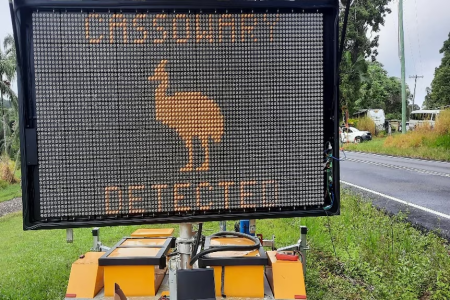Could unexpected tech shift help protect vulnerable species?
By
Gian T
- Replies 0
If you’ve ever driven through the far north, you might have spotted a road sign warning you to watch out for cassowaries, those striking, prehistoric-looking birds that are as iconic as they are endangered.
Many don’t realise, though, that these powerful birds are facing a growing threat. And it’s not a predator hiding in the rainforest—it’s the steady stream of cars speeding through their shrinking habitat.
In a world where artificial intelligence (AI) is often in the headlines for all the wrong reasons (deepfakes, anyone?), It’s refreshing to see this cutting-edge technology being used for something truly positive: saving the southern cassowary from becoming roadkill.
The Queensland Department of Transport and Main Roads (TMR) recently trialled a clever AI-powered system on the Kennedy Highway at Kuranda, about 30 kilometres north-west of Cairns.
For three months, a device called the 'Large Animal Activated Roadside Monitoring and Alert System' kept a watchful eye on a busy cassowary crossing.
Here’s how it works: a camera constantly scans the roadside, and when it spots a cassowary, the AI kicks in, boasting a whopping 97 per cent accuracy rate.
The system then sends a signal to roadside signs, which flash urgent warnings to drivers, telling them to slow down.
And the results? Impressive! During the trial, the department reported a 31 per cent drop in fatal cassowary crashes.
Drivers, on average, reduced their speed by 6.6 kilometres per hour when the warning sign flashed.
That might not sound like much, but as TMR’s Far North District director Darryl Jones points out, even a small reduction in speed can make a huge difference in reaction time and braking distance, potentially saving both bird and human lives.
The southern cassowary isn’t just a pretty face. These birds are vital to the health of our rainforests, acting as 'gardeners' by spreading the seeds of large-fruited plants that few other animals can manage.
Without cassowaries, the ecosystem would suffer, and some plant species could even disappear.
Unfortunately, road collisions are the leading cause of death for these endangered birds.
Last year alone, about two dozen cassowaries were killed on Queensland roads.
That’s a devastating blow for a species already under pressure from habitat loss, dog attacks, and other threats.
Local wildlife advocates and experts are cautiously optimistic. Tully veterinarian Dr Graham Lauridsen, who’s seen firsthand the toll that road deaths take on cassowary populations, welcomed the AI trial’s success.
He hopes the technology can be expanded to other hotspots, using existing data on cassowary movements to target the most dangerous crossings.
Kuranda Conservation Community Nursery’s Jax Bergersen also praised the system, but pointed out that a recent reduction in speed limits (from 80 to 60 kph for Cyclone Jasper roadwork repairs) may have played a role in the drop in deaths.
'It’s a great tool and it can be used in certain places, but I’m not sure it’s going to stop traffic if it’s going at speed,' she said.
Still, she’s keen to see the technology trialled in other high-risk areas, like Carmoo near Mission Beach, where cassowary deaths remain a tragic regularity.
The potential for this technology goes beyond cassowaries. Mr Jones from TMR suggested that similar AI systems could be adapted to protect other animals or children around school zones.
Imagine a future where our roads are safer for everyone, thanks to a little help from artificial intelligence.
For now, the trial equipment is being removed while TMR and its research partners look for funding to make the system a permanent fixture, and hopefully expand it to more locations.
With the right support, this could be a game-changer for wildlife conservation in Queensland and beyond.
 Have you ever had a close encounter with a cassowary on the road? Do you think AI is the answer to protecting our unique wildlife, or should we focus more on lowering speed limits and driver education? Maybe you have your own ideas for making our roads safer for both people and animals! We’d love to hear your thoughts and stories in the comments below.
Have you ever had a close encounter with a cassowary on the road? Do you think AI is the answer to protecting our unique wildlife, or should we focus more on lowering speed limits and driver education? Maybe you have your own ideas for making our roads safer for both people and animals! We’d love to hear your thoughts and stories in the comments below.
Read more: Travelling dad's 'amazing' encounter with endangered creature halts traffic
Many don’t realise, though, that these powerful birds are facing a growing threat. And it’s not a predator hiding in the rainforest—it’s the steady stream of cars speeding through their shrinking habitat.
In a world where artificial intelligence (AI) is often in the headlines for all the wrong reasons (deepfakes, anyone?), It’s refreshing to see this cutting-edge technology being used for something truly positive: saving the southern cassowary from becoming roadkill.
The Queensland Department of Transport and Main Roads (TMR) recently trialled a clever AI-powered system on the Kennedy Highway at Kuranda, about 30 kilometres north-west of Cairns.
For three months, a device called the 'Large Animal Activated Roadside Monitoring and Alert System' kept a watchful eye on a busy cassowary crossing.
Here’s how it works: a camera constantly scans the roadside, and when it spots a cassowary, the AI kicks in, boasting a whopping 97 per cent accuracy rate.
The system then sends a signal to roadside signs, which flash urgent warnings to drivers, telling them to slow down.
And the results? Impressive! During the trial, the department reported a 31 per cent drop in fatal cassowary crashes.
Drivers, on average, reduced their speed by 6.6 kilometres per hour when the warning sign flashed.
That might not sound like much, but as TMR’s Far North District director Darryl Jones points out, even a small reduction in speed can make a huge difference in reaction time and braking distance, potentially saving both bird and human lives.
The southern cassowary isn’t just a pretty face. These birds are vital to the health of our rainforests, acting as 'gardeners' by spreading the seeds of large-fruited plants that few other animals can manage.
Without cassowaries, the ecosystem would suffer, and some plant species could even disappear.
Unfortunately, road collisions are the leading cause of death for these endangered birds.
That’s a devastating blow for a species already under pressure from habitat loss, dog attacks, and other threats.
Local wildlife advocates and experts are cautiously optimistic. Tully veterinarian Dr Graham Lauridsen, who’s seen firsthand the toll that road deaths take on cassowary populations, welcomed the AI trial’s success.
He hopes the technology can be expanded to other hotspots, using existing data on cassowary movements to target the most dangerous crossings.
Kuranda Conservation Community Nursery’s Jax Bergersen also praised the system, but pointed out that a recent reduction in speed limits (from 80 to 60 kph for Cyclone Jasper roadwork repairs) may have played a role in the drop in deaths.
'It’s a great tool and it can be used in certain places, but I’m not sure it’s going to stop traffic if it’s going at speed,' she said.
The potential for this technology goes beyond cassowaries. Mr Jones from TMR suggested that similar AI systems could be adapted to protect other animals or children around school zones.
Imagine a future where our roads are safer for everyone, thanks to a little help from artificial intelligence.
For now, the trial equipment is being removed while TMR and its research partners look for funding to make the system a permanent fixture, and hopefully expand it to more locations.
With the right support, this could be a game-changer for wildlife conservation in Queensland and beyond.
Key Takeaways
- Artificial intelligence technology trialled on the Kennedy Highway at Kuranda has reduced cassowary road deaths by 31 per cent, with the system proving 97 per cent accurate at detecting the endangered birds.
- The technology uses roadside sensors and cameras to identify cassowaries and then activate flashing signs, warning drivers to slow down, which resulted in an average speed reduction of 6.6 kilometres per hour.
- Experts and locals say the trial has shown promising results, and there are hopes to roll out the technology to other cassowary hotspots, especially using existing data on their crossing points and frequent areas.
- Conservationists also note that reduced speed limits due to roadworks may have contributed to fewer fatalities, and emphasise the importance of protecting cassowaries for ecosystem health, given their role in seed dispersal.
Read more: Travelling dad's 'amazing' encounter with endangered creature halts traffic








